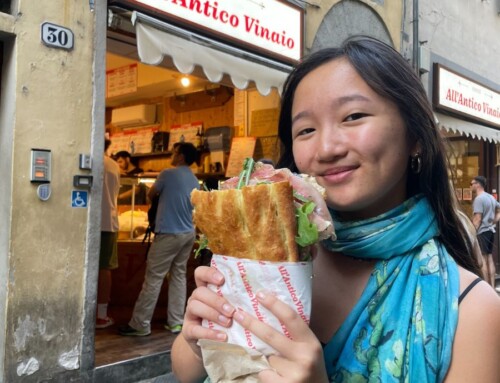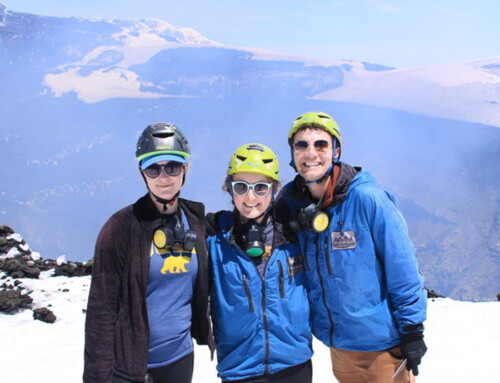Contributor: Shelby Ocana
UC Paris and Lyon Study Center administrator
Story highlights:
- A long-haul flight can produce more carbon than the average person does all year.
- Travel, and specifically study abroad, is an irreplaceable experience, but can be regenerative, too.
- Responsible travel is one of the best ways to save the planet.
As you think about your options for study abroad, the fact that your flight can produce 7 to 10 tons of carbon dioxide equivalent (CO2e) may give you pause. We hear that, and here’s something you should know—it is possible to travel to save the planet.
Consider these points:
- Travel plays a vital role in encouraging conservation because visitors are proof that nature and local natural treasures have value beyond the extractable resources.
- Tourism gives communities facing economic pressure a viable alternative to selling their land.
To leave a positive impact takes more than reducing the carbon footprint produced by your trip—you need to go beyond just sustainable practices. The right kind of travel—travel that is thoughtfully planned and executed—can help combat the warming of our planet.
But first, let’s understand some terminology
The terms green and sustainable point to environmental awareness and actions that preserve natural resources. The term regenerative is new. It’s forward-looking and far more promising.
A sustainable mindset about study abroad might translate into staying home and learning about faraway cultures online. Alternatively, a regenerative mindset sees beyond doom-and-gloom scenarios and works to heal and invest, rather than merely prevent additional damage.
The choices you make when deciding to study abroad can make a difference.
Here are some useful strategies you can implement to have a great study abroad experience while leaving things a little better.
Choose a place that has built-in sustainable policies
Many cities around the world have established no-car zones, bike lanes, efficient public transportation, and green spaces throughout to cut down on pollution and improve public health.
- Bristol, in the UK, has a long history of environmental leadership and was named a vegan capital of the world.
- Singapore has an ambitious eco-building program that asserts any greenery lost on the ground has to be replaced in the sky.
- Copenhagen, Denmark, is on track to be the world’s first carbon-neutral capital by 2025.
- Vancouver, Canada, has planted more than 100,000 trees since 2010, and its hotels grow vegetables and house bees on their roofs.
In choosing a place that has environmental policies in action, you’ll support those communities. You’ll also learn and adopt new regenerative practices you can implement back home.
Pick a program with a regenerative focus
In contrast to conventional sustainability, a regenerative approach values the interconnectedness between the natural and social environments and gives back to both.
The following are a few study abroad programs that match the destination to the community and provide an immersive opportunity to learn about a place, its people, and its customs:
- Human Rights and Cultural Memory (Argentina and Chile): Talk with survivors of the Dirty War, human rights activists, and participate in legal proceedings addressing human rights abuses.
- Leadership in Social Justice and Public Policy (California and Mexico): Learn about Mexico’s recent political history, and join an experiential internship on a policy issue like immigration, health, civil rights, and more.
- Socio-Ecological Sustainability in Southern Chile: Live as a conservationist in a natural retreat area and build a collaborative environmental and socio-ecological sustainability plan.
- Community Health in Mexico: Serve in a clinic, a children’s educational center, or a training center for environmental sustainability and turn your interest in health, human rights, and justice into a career.
- Pacific Islands Environmental and Community Health (Australia and the Solomon Islands): Get right in the action solving environmental and health challenges in a remote island community.
- Public Health in Thailand: Join your fellow students in shadowing medical service providers and learn firsthand about the public health challenges faced by local and immigrant populations in a rural village.
- Tropical Biology and Conservation (Costa Rica): Build your skills as a field researcher and present your findings at a symposium in a conservationists’ paradise.
If a study abroad program matches your academic needs, but doesn’t have regenerative activities built in, you can still make your study abroad experience regenerative. Volunteer or add an internship with a local organization that is actively working in the local community, whether by planting trees, building homes, or finding jobs for immigrants, for example. Talk to the study center staff about local opportunities.
Pack what you need to live like an eco-friendly local
Before you leave home, you’ll want to pack what you need to live like a local that cares about the environment.
- Bring your own containers—a reusable water bottle and shopping bag are practical, eco-friendly, and economical choices.
- Stuff organic and non-toxic sunscreen, DEET-free insect repellent, reusable razors, and a bamboo toothbrush into a packing cube made of recycled plastic.
- Carry a supply of reusable, plastic-free, and eco-friendly sanitary products (and purchase the same while abroad).
- Use solar-powered chargers and wireless speakers in your dorm room or apartment.
Make an impact with your purchases
When at a store, it’s easy to forget the impact each product and purchase indirectly supports. Was nature harmed in production or will it be harmed when you throw it away? Is the money from the purchase going to a local individual or a faraway corporation?
Local buying choices you can make on study abroad:
- Select sustainable lodging: Where you live matters, but how you live does, too. Sustainable housing will use sustainable energy sources and environmentally friendly cleaning products. It’ll also offer convenient recycling and composting programs.
- Buy locally grown food: One of the most delicious ways to go green while traveling is through food—from bustling open-air markets where you can purchase locally grown foods to restaurants and food trucks that are committed to sustainable sourcing.
- Choose low carbon transportation: Walking, cycling, and taking public transportation are great ways to limit carbon emissions while immersing yourself in the local culture and landscape of your new country.
Cities in Europe, India, and Asia have extensive, convenient, and cheap rail networks that make it so easy to explore that you may find it addicting.
The whole bustling city of Seoul was available to me and my friends, and we would go out almost every night to eat and relax. When I returned to the US, going out with friends was a challenge, not a reward. For a few months, I dearly missed the lifestyle I had while I was abroad. To this day, I want to move to a different city, and I’m considering moving abroad because the lifestyle offered by a city that serves its residents became so valuable to me.
Richard Pascual Magdaluyo, UCI
Act like a conservationist
One of the best ways you can travel lightly in your host country is by respecting the local rules and acting like a visiting conservationist.
Local actions you can take:
- Buy the items you need secondhand from local listings.
- Be mindful of your host country’s water usage and keep showers short.
- Get used to hanging your laundry to dry—many places don’t have clothes dryers anyway.
- Turn off the lights and go out to meet people. That’s why you’re here!
Pro tip: Attend events that are certified green, like music festivals that use solar-powered stage lights and virtual tickets.
Leave no trace
When you start packing before you leave your host country and return home, you may be surprised at how much you’ve accumulated. If you needed sheets, towels, or pots and pans while studying abroad, you can bet future UC students will as well. Ask your study center about options to donate items to the next group of students or donate them locally.
Education is, at its core, a regenerative process with lifelong potential. Studying abroad opens your eyes to how beautiful places can be—and inspires us to take care of them.










Leave A Comment